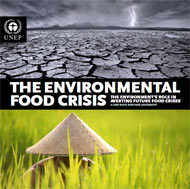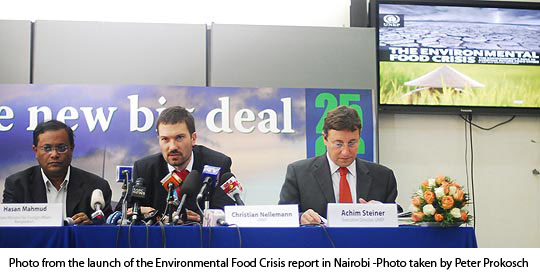The Environmental Food Crisis
 The Environment’s Role in Averting Future Food Crises
The Environment’s Role in Averting Future Food CrisesA new rapid response assessment report released by UNEP warns that up to 25% of the world’s food production may become lost due to environmental breakdown by 2050 unless action is taken. Prepared by the Rapid Response Assessment Team at UNEP/GRID-Arendal and UNEP-WCMC, the report provides the first summary by the UN of how climate change, water stress, invasive pests and land degradation may impact world food security, food prices and life on the planet and how we may be able to feed the world in a more sustainable manner. The report concludes that we need to get smart and more creative about recycling food wastes and fish discards into animal feed. While major efforts have gone into increasing efficiency in the traditional energy sector, food energy efficiency has received too little attention.
The Preface and Summary are available in html format:
Download the full report. (15 mb)
Maps and graphics featured in this report are available in theMaps & Graphics Library
The report offers seven major recommendations, including, short, medium and long-term:
- 1) Regulate food prices and provide safety nets for the impoverished;
- 2) Promote environmentally sustainable higher-generation biofuels that does not compete for cropland and water resources;
- 3) Reallocate cereals used in animal feed to human consumption by developing alternative feeds based on new technology, waste and discards;
- 4) Support small-scale farmers by a global fund for micro-finance in developing diversified and resilient ecoagriculture and intercropping systems;
- 5) Increase trade and market access by improving infrastructure, reducing trade barriers, enhancing government subsidies and safety nets, as well as reducing armed conflict and corruption;
- 6) Limit global warming; and,
- 7) Raise awareness of the pressures of increasing population growth and consumption patterns on ecosystems.

You can return to the main Market News page, or press the Back button on your browser.

